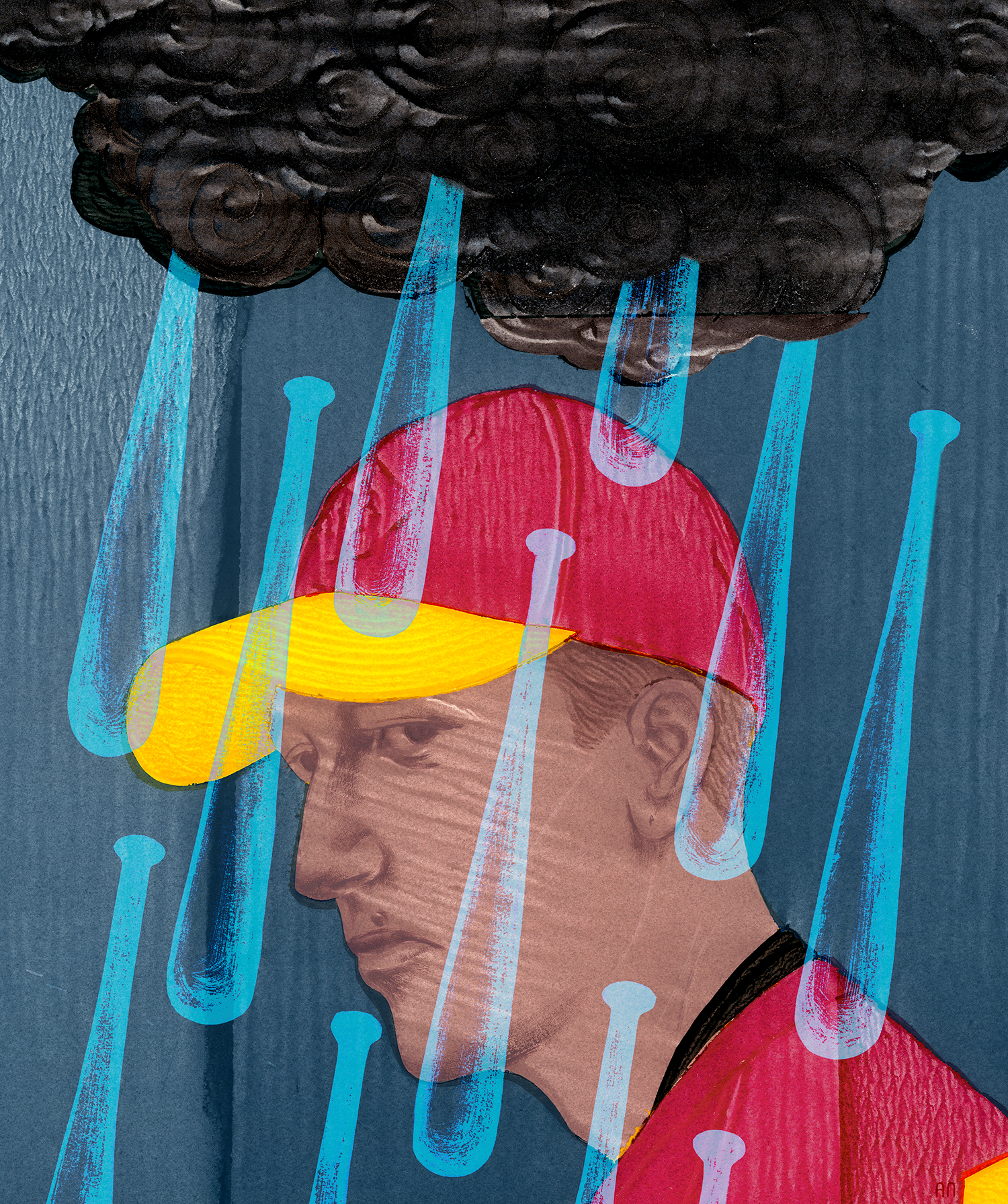Someone to Talk to
This former Husky and Tampa Bay Ray invented an app to help student-athletes battle isolation.

“I worked my whole life for my dream, and I just didn’t feel comfortable showing weakness as a competitor, speaking up, and sharing how I was feeling. Because of that, it dragged me down.”
“I just couldn’t get out of bed,” Bobby Melley ’16 (CLAS) says about that Sunday morning in his senior year when he’d logged 225 consecutive games as a starter on the UConn baseball team and sought to make it 226.
“I was so anxiety-riddled and isolated,” he says. “I ended up telling my coach that I had a stomach virus, that I must have eaten something wrong the night before. I ended the streak there, but I still didn’t tell anyone why and held up this strong exterior for a very long time.”
Years later, in his second season with the Tampa Bay Rays, on a bus ride through the Appalachian Mountains to a game in West Virginia, Melley says he just stared out the window, wondering what he was doing with his life and thinking about how miserable he was on the field every day.
Baseball — the very thing that had brought him so much joy as a child, the dream of playing professionally that became a reality — was now sucking the life from him. He didn’t pursue a second pro contract, and two years later, his long-stifled emotions erupted.
“I started having thoughts that I never imagined I’d entertain,” he says. “I did attempt to take my life. Luckily, I’m still here, and even though I’m not fully comfortable telling my story, it helps to vocalize it, to get it out.”
Melley believes that six years prior, as a young collegiate player, just talking to someone who understood the rigors of life as a student-athlete would have helped. If he’d just let down that tough competitive exterior and answered truthfully when someone asked how he was doing, it could have saved him so much heartache.
Helping people like Melley avoid the dangerous downward spiral that loneliness and self-isolation can lead to is a key mission of For All Ages, a Connecticut nonprofit founded in 2019 by alums Deb Bibbins ’87 (BUS), ’98 JD and Gary Sekorski ’85 (ENG). CEO Bibbins and COO Sekorski created intergenerational programs that connect individuals in communal activities, like the successful Tea @ 3 Community, which has paired more than 700 older adults and college-age students with similar interests for weekly telephone calls, and the annual Buddies & Bobbers Fishing Derby.
But a few years into their endeavor to foster social health, they knew they needed to address the loneliness epidemic. Research showed more than 60% of the population reporting being lonely regularly. Knowing that such loneliness can fuel anxiety, depression, and suicidal ideation, they started the CT Collaborative to End Loneliness.
“Loneliness has a stigma associated with it,” says Bibbins. “People are afraid to admit they’re lonely because they believe others are going to view them poorly or think something is wrong with them.” And you don’t need to be alone to feel lonely. You might be in a room filled with other people and be lonely because you feel you don’t belong, don’t have a connection with others.
“We all need to be thinking about how to improve our social connectivity intentionally,” Bibbins says. “If we can get everyone thinking that way, we believe we can kick-start this movement. We believe that if we can gather enough momentum and build a movement of social connectivity in the state of Connecticut, in a decade the collaborative won’t be needed — at least that’s our hope.”
The effort has working groups developing such initiatives as a screening for loneliness during annual medical exams. “We’re doing stuff that really matters, and we see results right away,” Sekorski says. “They’re simple things, that’s what blows me away. We’re not developing a billion-dollar drug. We’re not curing cancer. We’re just bringing people together, yet that’s just as important.”
Last fall, Bibbins and Sekorski brought together a panel of UConn students and alums, including Melley, to share their stories and talk about how they overcame their loneliness. It was part of a yearlong UConn Humanities Institute initiative to address the problem on campus.
Melley told the group the simple act of talking about his struggles has helped the most. He told them about SOAR (Student-athlete Online Anonymous Resource), the online forum he created for verified student-athletes to anonymously share posts about feelings, experiences, hardships, and anxieties. He says sending those things into the world is the start of healing. “Just to show that vulnerability is a huge step. A lot of people don’t get over that hump.” The app, which now includes a version for veterans, also offers users a list of professionals who can provide therapy and curb tragedies.
It’s an outlet, Melley says, he would have used from his dorm room at UConn.
“Times will get tough, and when they do you need to know there’s a place to speak up and somewhere to go where you can get the help you need,” he says.
“I worked my whole life for my dream, and I just didn’t feel comfortable showing weakness as a competitor, speaking up, and sharing how I was feeling. Because of that, it dragged me down. But if we can break through that barrier, hopefully by the time my kids are here and growing up, this won’t be an issue anymore.”
By Kimberly Phillips
Illustration by Alex Nabaum


Leave a Reply